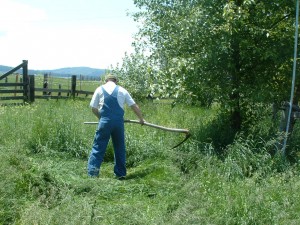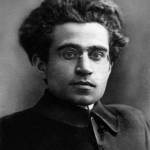The Christians I am closest to tend to fall into one of two camps as regards the question of “orthopraxis” — the question of what right Christian practice looks like. One camp sees right Christian practice as oriented “internally”: the practices that matter most before God are those which belong to my own inner life or to my individual communion with God. Prayer, meditation, the cultivation of a devotional life — these practices stand preeminent over what might be called “social” practices. But I am not interested in talking about this group in the present essay.
So to the second group. For the sake of symmetry, call them “externalists”. They see Christian practice as fundamentally characterized by a certain way of interacting with the external world. But there is a good deal of disagreement as to what this “certain way of interacting with the external world” comes to. I think my externalist friends tend towards one of two ways of understanding this “certain way”.
One contingent sees Christian practice as essentially concerned with personal and cultural evangelism; central to the task of following Jesus, they claim, is entering into the trenches of a “hearts and minds” campaign (only some in this group are “Evangelical” in the popular sense; many are Roman Catholic, for instance). The other contingent has more of a social justice bent to their Christianity; central to the task of following Jesus, they would say, is practicing regular acts of justice and mercy and joining in the struggle for more just and merciful communities. (My paraphrasing poorly represents the nuance with which many of these friends hold these orientations, but paraphrase is often a useful and, in this case, necessary tool).
Great friends. And, I should add, deeply committed Christians. Which is why they have felt so much concern over my choice of profession. You see, I left school to become a farmer, and both my evangelistic friends and my social-justice friends have found that decision disconcerting for much the same reason (albeit the same reason in two different window dressings). They are both concerned that a life of farming (especially on an isolated hillside in a small and isolated town) is too escapist. The culture evangelists see this farming gig as the loss of an opportunity to enter into a position that will allow me to influence a broad range of people, and do so – ideally – at a level that can actually reshape culture. Influence is the name of the game. Farming, unless you are an anomaly, is not likely to have the sweeping influence they have in mind. Hence the concern. The social justice folks similarly see this farming thing as the loss of an opportunity — in this case, the loss of an opportunity to help the most people I can help and effect the most justice I can effect. “Yes, you will be embedded tightly in a place, and, yes, you will provide useful goods to your place, but you should be in Boston, not Randolph, Vermont. Population centers are the epicenters of justice and injustice, the arteries where the most bleeding can be stopped.”
I have had many of these conversations, and I have tried many times to alleviate their concerns. But quite often, and at around the same point each time, our conversations misfire; we begin to start talking past each other. I have come to the opinion, very gradually, that what is going on in these conversational misfires is not an inability to dialogue. I think there is disagreement at the level of some deeply-buried assumptions – assumptions which we each took for granted in our conversation. Let me attempt to describe the assumption I think many of my friends have made, and then I will try to describe where I think my own assumptions part ways with theirs.
I think many of my friends (in both clans) are assuming a sort of utilitarianism in their conception of Christian orthopraxis. That sounds harsh. I don’t mean that these friends are Utilitarians in the sense that they hold to an ethical theory like that of Jeremy Bentham’s or J.S. Mill’s. I merely mean that latent in each of their conceptions of right Christian practice is a subtle calculus which identifies the good Christian life with some sort of maximization of quantity — the difference between the conceptions being the units which are in need of maximizing. The evangelists see the good Christian life as one in which his or her cultural influence is maximized; the more ears and eyes you reach the better. And the social justice crowd sees the good Christian life as one in which you have effected the most justice: fed the most hungry, clothed the most naked, healed the most sick.
On such views, my farming does, in many ways, look like impotent cultural influence and a slow and sorry form of struggling for justice. Which is why they expect me to give some defense against this appearance, to explain how my farming could turn out to be culturally and societally impactful. But if I am being honest about how I most see my farming intersecting with my Jesus following, such a defense is not what I am going to talk about. I am going to talk, instead, about the weight that I give to things which are (I struggle for the right words here) intangible, ineffective, and downright impotent. Give me a moment to explain what I mean by this.
As a disclaimer, I consider tangible neighbor love – feeding the hungry, clothing the naked, healing the sick, etc. – to be at the very heart of the Christian Way. I don’t see myself disagreeing very much with Leo Tolstoy or Peter Maurin or Dorothy Day (or Father Zossima) as to the importance and centrality of such love. But it seems to me that close beside such tangible, effective, and potent love, are practices which are wholly symbolic in nature, but which are – for all “practical” purposes – completely intangible, ineffective, and impotent.
I think of those early Christian martyrs. Whole families thrown to the lions in some instances. The martyrdom of these (remarkable) Christians was, as a matter of historical fact, remarkably effective: There are many testimonies of those who entered into the Christian Way because of the hope and willingness of these martyrs. But I find it silly to suppose that these martyrs went willingly before the lions, refusing to acknowledge the ultimate and unconditional sovereignty of Rome, because they expected such an effect. I think that they went willingly to such a death because they believed that in so doing they were affirming the Kingship of Jesus Christ, and the goodness and truth of his death and resurrection, and of their confidence that they would share in his death and resurrection. What they believed they were doing was, in one sense, completely intangible, ineffectual, and impotent — but they did it all the same! This symbolic gesture was, in fact, so precious to them that these Christians were willing to bring their own children into the arena with them.
One needn’t turn to the exceptional example of the martyrs to find Christian practices the chief significance of which lie in their symbolism. Think of the great liturgies of the Church. I have heard some of my friends praise liturgical practice on the basis that liturgical practice is a preparation for the work of culture-shaping or justice-doing. Liturgical practice may very well provide such preparation. But it seems to me to belittle (“be-little”) our liturgies to make this the central feature of them. Now I do not mean to similarly belittle our liturgies by suggesting that symbolic proclamation is the central feature of them either; but I do mean to suggest that a great deal of the value of liturgical practice lies in their being a sort of symbolic proclamation – to God, to each other, to the world, even to “the rulers and authorities in the heavenly places” (Eph. 3:10). There is much to be said here. But space says, “Another time.”
Think also of the tradition of Christian Pacifism that has been present throughout the history of the Church (often as a minority tradition, but a tradition nevertheless). Christian Pacifism, whatever you think of the correctness of the position, becomes a great deal more intelligible when one gets outside of the utilitarian paradigm. If one insists that tangible effect is always embedded in the telos of right Christian activity, pacifism can be very, very hard to understand (much less accept). But if one includes “ineffective” symbolic proclamation as a legitimate and fundamental Christian activity, pacifism becomes significantly more intuitively available (and I think, more plausible). What could justify the choice of non-violence in the face of defensible evil? Potentially, what this choice would proclaim about the nature of the Kingdom of God.
I have tried to explain what I meant when I said that I give weight to practices which are intangible, ineffective, and impotent in my conception or right Christian practice. I had symbolic gestures especially in mind. I consider such gestures central to a well-lived Christian life. And I believe, with a good deal of confidence, that this life of farming is faithful to God in large part because of its symbolic significance. I could list all the ways in which this farm benefits the community – about the healthy food, the good work, the educational provisions. I could talk about environmental stewardship, democratic land distribution, inter-generational continuity, and the value of local economies. I could talk about the economic and missional cooperative that we are forming. This farm connects with all of those things, and all of those things connect with the work of the Church in some way or another (or so I believe). But I would be giving you an incomplete representation of why I followed Jesus onto this New England hill farm if I gave you such a list. For I would be failing to mention something I believe very strongly: that farming is a liturgical act (at least it is when one is farming well – which, in my case, is less often than ought to be the case). And, like any good liturgy, it is a liturgical act the significance and meaning of which only slowly reveals itself. I don’t even understand most of what I am saying and what gestures I am making before God when I am participating in this liturgy of field and forest. There is this much, though, that I am sure of – I can feel it in the work: Good farming affirms the goodness of God, it affirms the goodness of all creatures great and small, it affirms the goodness of man, and of the human body, and of what Tolstoy affectionately called “the brotherhood of all men” and of what Wendell Berry calls “the community of creation”. And it does more than affirm: without even intending to, you very often find that you are engaged in an act of gratitude. I am not talking about the feeling of gratitude. You find that the work of farming just is gratitude.

















